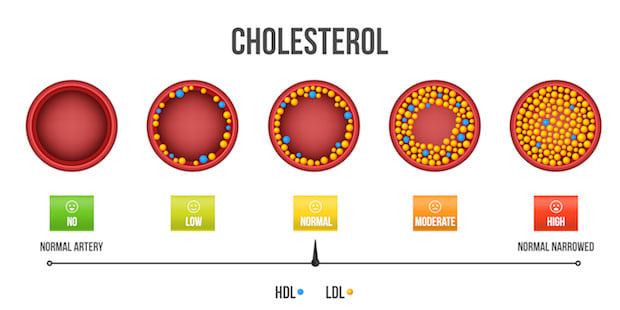Table of Contents
IV. Does High Cholesterol have Symptoms?
VI. Medications for High Cholesterol
What is Cholesterol?
Cholesterol is essential to the human body. Cholesterol is present in cell membranes that border every cell. If there is no cholesterol in the body, T-cells (a type of white blood cell) would not be able to maintain their cell membranes, and the cells would rupture.
Cholesterol is also integral in manufacturing sex hormones like testosterone and progesterone. The skin needs cholesterol to manufacture vitamin D, which allows the body to handle calcium and maintain bone density. In the digestive system, cholesterol forms bile acids and breaks down fats in the stomach to be absorbed into the body. As you can see, cholesterol has numerous jobs in the body. So why does the word “cholesterol” often have a negative connotation?
Within the body, there is “good” and “bad” cholesterol. Most of us associate cholesterol with the bad version, but we need good cholesterol as well. High cholesterol can pose several dangers to the body if it gets out of control. As American obesity rates increase, so do high cholesterol levels. Because of this, there are several medications available to assist in lowering cholesterol, including Zocor (simvastatin), Lipitor (atorvastatin), Crestor (rosuvastatin), and Zetia (ezetimibe). Read on to learn more about cholesterol and risk factors for high cholesterol. [1]
Your cholesterol levels are closely related to the health of your heart and cardiovascular system. High-density lipoprotein (HDL) is referred to as the “good” cholesterol and helps remove unhealthy forms of cholesterol from the bloodstream. When your cholesterol is in a healthy range, it carries cholesterol particles back to the liver and flushes them out from the body. If you have good levels of HDL, you are at a lower risk of developing heart disease. High cholesterol can only be identified through a blood test. The results of this test are measured in milligrams (mg) of cholesterol per deciliter (dL) of blood. Unlike other medical tests, the higher your cholesterol number, the better. For both men and women, a healthy cholesterol level is 60 mg/dL or above. Men are at risk for high cholesterol and its accompanying conditions if they have a reading of less than 40 mg/dL. This number is 50 mg/dL for women. [2] Low-density lipoprotein (LDL) is a tiny blob made of a lipoprotein outer rim with a cholesterol center. LDL is considered “bad” because it collects in the walls of the blood vessels over time. Increased cholesterol accumulation in the blood vessels greatly increases your risk of heart attack or stroke. A cholesterol test also measures triglycerides, a type of fat that stores extra energy from your diet. As an adult, doctors recommend getting your cholesterol tested every four to six years. If you already have heart disease, diabetes, or a family history of high cholesterol, you will likely want more frequent testing. [3] In most cases, high cholesterol does not present any symptoms. Only when levels are incredibly high will symptoms make themselves known. Once symptoms are present, it is likely that there is already plaque formation in the arteries. Plaque in the arteries inhibits blood from reaching its destination, which can lead to serious complications. [4] Smoking: Smoking cigarettes increases your chances of several complications. Over time, cigarettes can damage the blood vessels' walls, which makes it easier for fatty deposits to collect on the arterial walls. Your HDL levels may also decrease if you smoke cigarettes. Age: Body chemistry changes as the body ages. This may cause LDL levels to increase and HDL levels to decrease. Doctors recommend that older adults get more frequent cholesterol tests to keep an eye on their cholesterol levels. Obesity and Inactivity: An inactive lifestyle often goes hand in hand with obesity. If your body mass index (BMI) is above 30, you are at a greater risk for high cholesterol. Exercise boosts your good cholesterol and decreases the size of LDL particles, making them less harmful to the body. If you do not move around a lot, your LDL will increase. Diet: A diet high in saturated and trans fats can significantly raise your cholesterol levels. Many of these foods are found in pre-packaged processed foods, like cookies, crackers, and microwave popcorn. Red meat and full-fat dairy products can also increase cholesterol. [5] As mentioned earlier, only a cholesterol blood test can determine if you have high cholesterol. Once your doctor interprets your levels, a treatment plan will be put together by your care team. Typically, a change in lifestyle habits is the first line of defense. You will want to start eating a healthy diet and an exercise routine. Along with these changes, doctors may prescribe medications. The type of medication prescribed depends on personal risk factors, age, and general health. The most common types of high cholesterol medications include: Statins: Zocor (simvastatin), Lipitor (atorvastatin), and Crestor (rosuvastatin) are common statin medications used to lower cholesterol. These drugs block a substance in the liver that makes cholesterol and help remove cholesterol from the blood. Statin drugs also reabsorb built-up deposits on the arterial walls and can help reverse coronary artery disease. Bile-acid binding resins: The liver uses cholesterol to make bile acids to assist in digestion. This drug lowers cholesterol by binding to bile acids, reducing the level of cholesterol in the blood. Cholesterol absorption inhibitors: Normally, the small intestine absorbs cholesterol from what you eat and releases it into the bloodstream. Zetia (ezetimibe) limits the absorption of dietary cholesterol and is often used alongside statin drugs. [5] The content provided in this article is based on thorough research and in some cases, reviewed by a medical professional. Our goal for the information is to provide helpful, general health informational. It is not intended as a substitute for professional medical advice.
“Good” Cholesterol
“Bad” Cholesterol

Does High Cholesterol have Symptoms?
Risk Factors for High Cholesterol

Medications for High Cholesterol
